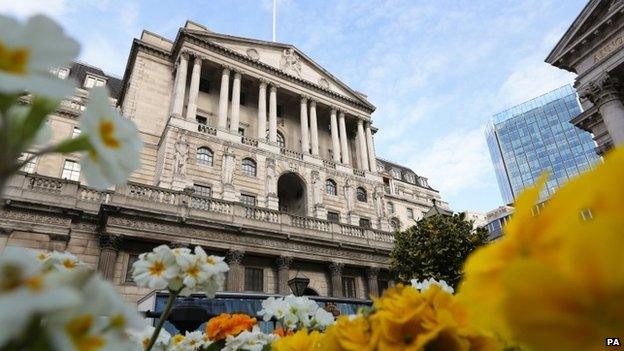Why is governor signalling early rate rise?
- Published
- comments

When the governor of the Bank of England told the City at the Lord Mayor's Banquet tonight that an interest rate rise could happen "sooner than markets currently expect", he might equally have said, "sooner than I expected".
The point is that markets reflect signals on the timing of a rate rise emitted by Mark Carney and his colleagues on the Bank's Monetary Policy Committee.
And those signals have, till tonight, been pointing towards an interest rate rise in the first half of next year.
But as of Thursday evening, a small rise in the Bank rate of 0.5% (so close to zero as makes little difference) - a likely increment of 0.25% - seems probable some time this year.
Strong momentum
As I've said before, there would be huge political advantages to moving early, perhaps in the autumn, because the Bank would not be vulnerable to accusations that it was in some sense influencing the outcome of next May's general election - which would be an issue if it raised rates either just after or just before the election.
But although this governor has conspicuously sensitive political antennae, his avowed reason for saying that the "start of the journey" to increase the cost of money "is coming nearer" is that the momentum in the British economy shows no sign of slowing.
Growth is strong and employment creation is strong - which means that the spare capacity in the economy, which the Bank estimates at 1% to 1.5% of GDP, may be used up sooner than the Bank had been anticipating.
And that would in turn mean that inflation might start to accelerate, because companies would have to pay more to hire people, and would have to pass on those higher costs in the form of rising prices.
That would necessitate interest rate rises to slow the economy and suppress the inflation.
That said, the Bank had been taking the view that towards the end of the year, growth would slow and productivity would rise.
That would dampen inflationary pressures even without an interest rate increase - when productivity or output per worker improves, companies can pay their people more, without feeling under pressure to increase the selling price of their goods and services.
But as Mark Carney concedes, what we can observe right now is a buoyant economy - and the automatic corrective action, of a slowdown and improved productivity, is hypothetical.
So he says that the Bank may feel obliged to take out insurance against the economy overheating by imposing the dampening influence of a small interest-rate rise.
Change of view
But there is something slightly curious about this change of tune by the governor, in that the economy is performing broadly in line with the Bank's forecasts.
A cynic might, therefore, observe that if Mr Carney is saying that interest rates should rise sooner rather than later, what has probably changed is the balance of opinion on the MPC, rather than the economic fundamentals.
Mr Carney may be positioning himself at the vanguard of a hawkish consensus to raise rates early, having hitherto been more of a dove, perhaps because he doesn't wish to be seen to be a defeated dove.
Even so, in other respects he is sticking to his old tune, by insisting that rate rises will be small and gradual.
And although he says markets may be wrong that the first interest rate increase is some time away, he implies markets are right to believe that the policy rate will rise to only 2.25% over the next three years - because it is on that path for interest rates that the Bank believes the economy will become more balanced and the output gap will almost be closed.
In other words, for those of you with big debts who have been made anxious that the era of free money is drawing to a close, there is some comfort to be had that there should be no return to penally priced money for many years.
Due to technical problems this blog had to be published twice. Some reader comments are on the earlier publication below.